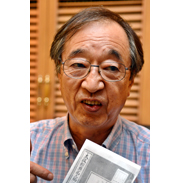Deadlocked Korea-Japan ties
 Two countries need dialogue. Japan should look honestly at history to clear the past.
Two countries need dialogue. Japan should look honestly at history to clear the past.
After President Lee Myung-bak visited Dokdo, Korea’s easternmost islets, on Aug. 10, Tokyo recalled its ambassador to Korea, Masatoshi Muto, and announced it would take the issue of Dokdo to the International Court of Justice.
Japanese media have reported continuously that Dokdo originally belongs to Japan.
They also claimed the move was a deliberate act to restore support from the people who have lost faith in the President.
However, Lee urged future good relations between Korea-Japan.
During his visit, he demanded that the Japanese king apologize for Japan’s colonial rule of Korea (1910-45), provoking Japanese ultra right-wing nationalists such as Citizens against Special Privileges of Zainichi (Koreans in Japan).
They protest under the slogan of “Koreans go back” everywhere in Japan, and some Cabinet members even insist on the withdrawal of the Kono statement of 1993, an apology for Japan’s wartime sexual slavery.
Some Japanese friends or Korean acquaintances wonder why Lee visited Dokdo at that time, despite the fact that the Dokdo issue has long been a contentious matter between the two neighboring countries.
Following his visit, tensions grew between Korea and Japan.
Seoul returned Japanese Prime Minister Yoshihiko Noda’s letter and Tokyo denied entry the of a Korean diplomat into the Japanese Foreign Ministry.
These awkward actions escalated conflict between the governments of the two countries.
Tokyo also denied Korean actor Song Il-guk entry to Japan for his participation in a Dokdo relay swimming event.
The Japanese deputy minister even stated, “That is the current emotion of the Japanese.”
Perhaps, both Lee and Noda are exploiting the current situation to jack up their low approval ratings ahead of major elections.
So the question is what should be addressed to heal the bilateral relationship.
First of all, Japan has yet to clearly provide an apology and compensation for the invasion of other Asian countries during its colonial era, including atrocities committed since the 19th century.
It is obvious that cleaning up the past will be important to improving relations for the future.
On Aug. 30 last year, Korea’s Constitutional Court ruled that it is unconstitutional that the Korean government doesn’t make concrete efforts to settle the compensation issue of sexual slavery.
Based on this, President Lee suggested a compromise on the issue of the victims or “comfort women” to Noda but he showed no interest in the matter at their summit in December last year.
Furthermore, there remain many other unsettled historical issues, such as forced Korean laborers to whom Japanese companies owe billions of dollars in unpaid wages, a massacre of Koreans by Japanese soldiers in Sakhalin, and Korean victims of the atomic bomb dropped on Hiroshima.
Tokyo must assume full responsibility for its past in order to regain trust and seek a future-oriented relationship.
Secondly, the territorial dispute provoked by biased nationalism could lead to war.
Such drastic action should be prevented by calmly reexamining history.
Unfortunately, Japanese media have failed to look into the truth behind the thorny issue, becoming a mouthpiece of the Foreign Ministry, which insists that Dokdo is an indigenous Japanese territory.
Though Japan registered Dokdo as its territory in 1905 based on grounds that the remote islets were deserted, a document by Dajo-kan (Great council of Japan during the Meiji Constitution) reveals that Dokdo was part of Korean territory.
When Korea’s Yonhap News Agency asked an official statement on the Dajo-kan document to Japan’s foreign ministry, it replied, “We are still investigating the matter and there is nothing we can answer.”
Before Japan blames Seoul for allegedly occupying Dokdo without legal grounds, Tokyo should come up with a good explanation on the document from the Meiji government.
I was surprised to watch NHK news.
“Although there has been a calm response from Tokyo, the Ministry of Foreign Affairs of Korea has dealt with weird behavior,” it reported.
Is it a calm response to throw a Korean diplomat out of the Foreign Ministry in Tokyo?
It is important for the two countries to keep calm. I hope both countries will control their tempers.
By not indulging in biased nationalism and looking honestly at history, Korea and Japan can create a peaceful future.
Okada Takashi is a professor at Keimyung College in Daegu and co-representative of the Citizens’ Network for the Centenary of Japan’s Forced Annexation of Korea. <The Korea Times/Okada Takashi >

























































